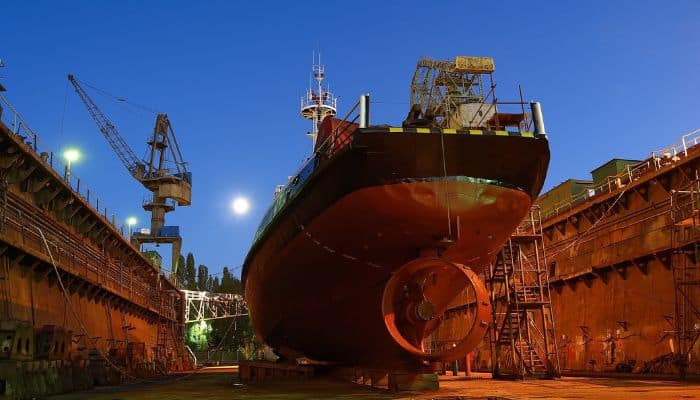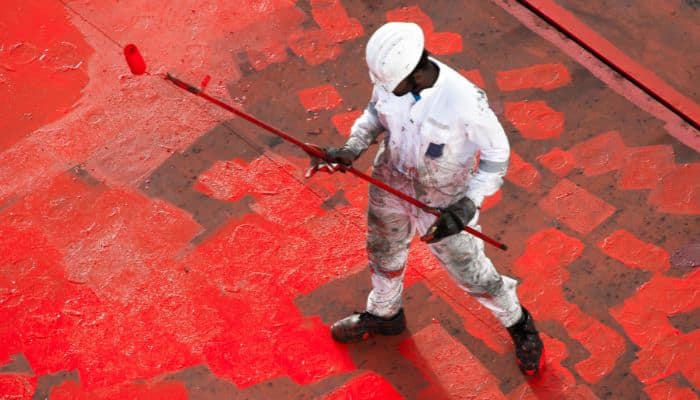Corrosion can be a major issue for any industry that works with metal, including the shipping industry. The harsh marine climate, with its high salt and moisture levels, makes the ships prone to corrosion. If left unattended, it can weaken the ship’s construction, raising safety issues and requiring expensive repairs.
Corrosion is a process that occurs with metals, involving them moving towards their lowest energy state, which results in a quick reaction between the environment and the metal, hence degrading its quality and life. Corrosion is derived from the Latin word ‘corrodere’, which means ‘gnaw to pieces’.
In case of the marine or shipping sector, mild steel is the most preferred metal for constructing ships due to its low cost, mechanical strength and ease of fabrication. However, its main issue is that it corrodes quite easily as it comes in contact with the salty water of the sea. Secondly, if it is not properly protected, it loses its strength quite fast, which could lead to structural failure.
While a way to prevent this is to repair the coating while the vessel is offshore, it can cost up to 100 times the cost of the first coating, and according to NACE International, the total cost of corrosion in the marine sector across the world is somewhere between 50 to 80 billion dollars annually.
However, if shipowners start with adequate planning and are careful with the first coating, their ships will give the best performance and maintain cost efficiency.
If the reason for the deterioration is poor preparation of the surface, then the solution is to remove the paint and do it again.
There are two kinds of corrosion which are relevant to the shipping industry, which is pitting corrosion and corrosion by bacteria or bacterial corrosion.
Therefore, shipbuilders and operators take many steps to protect their vessels from corroding. This article will discuss some standard methods used to shield ships from corrosion.
Here are the ways to prepare the ship to fight corrosion:
Enhancing the Ship Design
Ship designers and operators put in the effort to reduce corrosion to expand the lifespan of ships and keep them secure. A few design features can help reduce the rate of corrosion and reduce maintenance costs during the ship’s active life.

- Properly placing scuppers and drains is essential to aiding the draining of water from decks, wells, and bilge areas, eliminating a direct cause of corrosive activity.
- To reduce galvanic corrosion, insulation should be set up in areas where different metals are placed close to each other. An impressed current system that monitors corrosive cell activity and applies a current to protective anodes can also be installed to detect and manage corrosion.
- In locations with temperature shifts, insulation is needed to stop thermal fatigue.
- Anti-vibration practices, such as fitting turbine machinery with sliding feet, can minimise metal fatigue, and sacrificial anodes made of magnesium, aluminium, or zinc can protect against corrosion.
- Utilising corrosion-resistant alloy steel or stainless steel can also decrease corrosion. Installing rubbing strakes or doubling plates to take in extra wear and tear can also help extend a ship’s service life.
- Structural user-friendly design to allow maintenance and coating applications can also make it easier to control corrosion once a vessel is in operation.
Incorporating these design features at the building stage can significantly reduce maintenance costs and control corrosion.
Coating
One of the most effective ways to protect ships from corrosion is by applying coatings to the ship’s surfaces. These specialised paint coatings are a barrier between the metal surface and the corrosive environment. As the ship hull and open deck are in constant contact with water and the sea atmosphere, this additional layer of protection prevents moisture and salt from coming into contact with the metal surface and reduces the likelihood of corrosion.

Hull paint coatings also prevent sealife, such as algae and molluscs getting attached to the hull which may expose the metal to the seawater and increase the corrosion rate. They also provide a smooth hull surface to reduce the drag and resistance over the hull, thereby increasing fuel efficiency.
Cathodic Protection
Cathodic protection is a method that involves the use of sacrificial anodes. As the name suggests, sacrificial anodes are made from metals that are more anodic than the metal being protected. They get corroded (or sacrificed) instead of the ship’s metal, thereby saving the metal from corrosion.
There are two types of cathodic protection: galvanic and impressed current.

Galvanic cathodic protection involves the use of sacrificial anodes that are connected to the metal being protected. When the anodes corrode, they release electrons, which flow to the metal and prevent corrosion.
Impressed current cathodic protection, on the other hand, involves using an external power source to provide the electrons needed to protect the metal surface.
Both types of cathodic protection are effective in protecting ships from corrosion. Impressed current cathodic protection is generally preferred for covering larger surface areas, and it can be precisely adjusted to meet the ship’s specific needs.
Sacrificial anodes are used in smaller areas or in the machinery which carries or uses seawater.
Corrosion inhibitors
These are the chemical compound applied on the surface of the metal. This is not a preventive method, but corrosion inhibitors reduce the corrosion rate on materials such as metal or alloy.
Corrosion inhibitors are a cost-effective solution for preventing or controlling corrosion on ships, as they can save up to 35% of losses due to pollution. One major advantage of using corrosion inhibitors is that they allow for the use of cheaper metals in harsh environments, extending the operational life of the materials. This not only reduces maintenance costs but also provides lasting protection against rust.
Another method for corrosion prevention is anodic protection, although it is not commonly used in the shipping industry due to the requirement of a constant source of electricity, which can be challenging to maintain during a blackout.
In conclusion, there are various ways to prevent ship corrosion, such as cathodic protection, which includes the use of sacrificial anodes and impressed current systems, as well as applying coatings to areas of the ship that are more exposed to seawater with dissolved salts. Routine maintenance is also crucial in ensuring the long-term durability of the ship.
Overall, investing in corrosion prevention methods like corrosion inhibitors can significantly extend the lifespan of ships and reduce maintenance costs in the long run.

